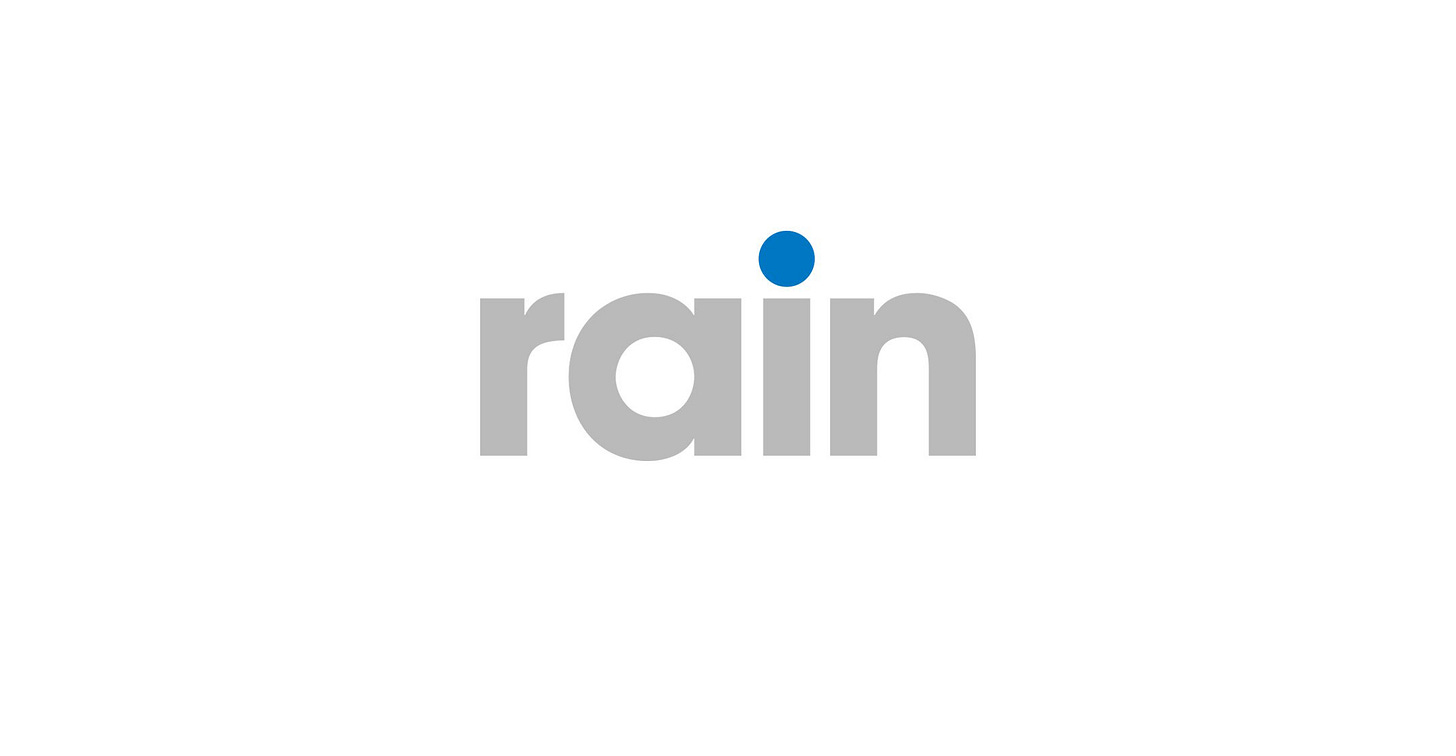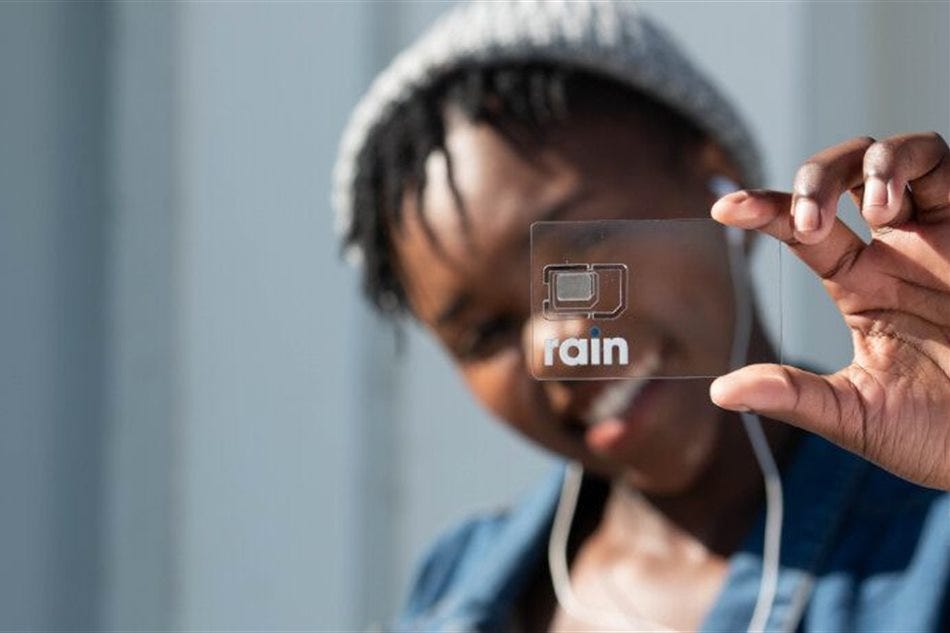South Africa's Billion Dollar Startup?
The story of the polarizing mobile network provider - rain.
Hello there, Welcome back. I just wanted to thank you for reading. I enjoy writing this newsletter & engaging on each topic every week. I normally write about tech-enabled startups in South Africa, or how certain technology trends might be relevant for South Africa & sometimes the founding story of innovative companies in South Africa.
This week I want to tell a story again, how a dying horse turned into a unicorn startup with the help of South African visionaries. This is the story of the polarizing mobile network provider - rain.

The Beginning - Wireless Business Solutions (WBS)
An itweb.co.za article from 23 December 2004 starts with:
“South Africans finally have access to effective and affordable mobile broadband Internet access through an internationally well known mobile broadband solution iBurst, provided by Wireless Business Solutions (WBS)”.
WBS Holding (Pty) Ltd & its subsidiary Wireless Business Solutions (Pty) Ltd were founded in 1999, rebranding from Vula Mobile Data after receiving investment from Telecel Zimbabwe. WBS started as a network provider for South Africa’s Lottery system. After 3 years of operations, WBS decided to apply for a different telecommunications license with the intention of providing broadband internet. ICASA, South Africa’s telecommunications regulator granted the license & WBS began testing iBurst broadband services. iBurst is a mobile broadband wireless access technology (MBWA) used to optimize bandwidth that was developed by a US company called ArrayComm.
WBS brought iBurst to South Africa in 2004 & introduced one of the first broadband services in the country. The iBurst 1Mbps service was offered at 1GB for R469, 3GB for R599, 6GB for R899, and 10GB for R1,099 (Yikes!). iBurst (Pty) Ltd was officially incorporated in 2005 & future Mxit CEO, Alan Knott-Craig Jr, son of Vodacom founder Alan Knott-Craig Sr was appointed CEO.
Evidently, Vodacom acquired a 10% stake in WBS in 2006 & then increased it to 24.9% in 2008, a partnership that will prove to be very important in the founding of rain.
The partnership between WBS & Vodacom continued for a few years albeit with some level of controversy stemming from unpaid fees the former owed to the latter in a venture called WiMAX. By 2012 it was pretty clear that the 1-2Mbps of broadband internet speed iBurst was capable of would not be able to scale & was unable to compete with 3G & ADSL. WBS & iBurst was eventually sold to a company called Multisource in 2015.
Multisource - Enter Michael Jordaan & Paul Harris
The most important thing for a telecommunications company is the spectrum.
Basically:
“The word spectrum in this context refers to a range of radio-waves that are used for communication purposes. This includes the FM or AM radio broadcasts that you listen to on the way to work, and even other wireless forms of communication like Bluetooth and Wi-Fi. The smartphone you're using also uses these same radio waves to transmit data, and the difference really lies in the specific frequencies in use, and of course, the technology used to convert those waves into something useful (whether that's the voice on the radio, the SMS you read, or the webpage you load).” - Gopal Sathe, gadgets.ndtv.com
& the most important characteristic of the spectrum is frequency. I'll let Gopal explains this too:
“The one characteristic you need to understand about spectrum is frequency - that's the number of repetitions of the wave you see in a second. You can easily understand this from the image below - the top-most wave is low-frequency, and so it repeats slowly. In the time that it makes three repetitions, the bottom-most (high-frequency) wave repeats 10 times. The high-frequency wave has obviously travelled a lot further in the same amount of time, but in a straight line, they've both gone as far - so the high-frequency wave needs much more energy to travel the same distance. On the other hand, in the space it takes for three pieces of data in the first wave, you can fit 10 in the second, so you can pack more information into high-frequencies, in the same amount of time.” - Gopal Sathe, gadgets.ndtv.com

Obviously, because these waves are inherently around us, not everyone can do as they please & broadcast signals. Communication would be chaotic, I mean how is the government supposed to spy on us if the airwaves are overloaded. This is why governments regulate spectrum in bands e.g 900 megahertz (MHz), 2.6 gigahertz (GHz) etc. What happens is that telecommunication companies bid for spectrum via an auction tendered by the government through a regulatory body, in this case, ICASA.
When Multisource bought WBS in November 2015 they were buying the lucrative 1800MHz & 2.6 GHz spectrum, which is used in 4G/LTE technology. Michael Jordaan, through his Montegray Capital, owned a 16% stake in Multisource. His former boss, Paul Harris owned quite a bit of Multisource too (66%) through an investment company called InstituteX.
After the WBS acquisition, Multisource got working on the 1800MHz spectrum to spin out a new mobile telecommunication startup using the latest LTE technology.
rain was officially born, founded by Michael Jordaan, Paul Harris, Gustav Schoeman, Duncan Simpson-Craib & Ravi Naidoo. Duncan Simpson-Craib would be CEO, Gustav Schoeman as CTO, Paul Harris as Chairman, Michael Jordaan & Ravi Naidoo joined the board.
rain - Your Unlimited Data Network
The mobile network provider rain officially launched in 2017. It took around 18 months or so from inception to launch. The rain team started by building an LTE-A network with 300 base stations. Basically, an LTE-A network is a next-gen network for mobile communication that is used in 4G technology — fast data. Up to 100Mbps in fact. & base stations are those funny towers full of microwave satellites.
rain had an unconventional start, so can it be classified as a conventional startup?
Stripping everything away & focusing on what a startup is, we can see rain fits the definition:
“A startup is a company designed to grow fast. Being newly founded does not in itself make a company a startup. Nor is it necessary for a startup to work on technology, or take venture funding, or have some sort of "exit." The only essential thing is growth. Everything else we associate with startups follows from growth.” - Paul Graham
& grow they did.
When the company launched in 2017 they had 750 base stations, up from 300 in 2015 & then increased the stations from 750 to 2000 by the end of that year to increase coverage. They first migrated the 30 000 customers left on iBurst to the new rain network & introduced a new sim card.

Base stations tend to be on the expensive side so rain needed to raise money. First outside capital in the door was South African billionaire Patrice Motsepe buying 20% of the company in July 2017. Patrice would pour another R1.12 billion (~ $65 million) into the company a year later at a R11.6 billion valuation (~ $680 million).
The value proposition of rain was & still is; unlimited mobile data for a fixed price, direct to consumer (D2C). But that’s not the only business model. Remember the relationship WBS had with Vodacom back when iBurst was launched? It turns out Vodacom invested R2.35 billion (~ $138 million) in rain & would pay an ongoing license fee for spectrum that rain held through the acquisition of WBS. Vodacom pays for the lights to be switched on & in turn rain invests in building a core consumer & later business user base.
The strategic imperative of focusing on the consumer necessitated a visionary consumer-focused leader. So Duncan Simpson-Craib stepped aside & the board brought in Co-founder & Outsurance CEO, Willem Roos as CEO of rain in October 2017.
rain continued to focus on building out its network of base stations in 2018, signing lucrative deals with the likes of Huawei for 5G infrastructure.
By the end of 2019 rain had 100 000 customers & roll out 5G routers, thanks in part to a licensed 3600MHz band of spectrum & the partnership with Huawei. Valuation was now at R13.101 billion (~ $770 million).

source:extensia-ltd.com
COVID-19 & Consumer Growth
rain was under the radar for most of 2019, choosing to invest in distribution & technology more than marketing. Growth was largely organic, driven by word of mouth. Though, the company did make a splash by hiring a Chief Marketing Officer in December 2018. The focus was clearly on managing growth while adding more base stations for 4G coverage & most importantly positioning the company for the future with investment in 5G technology.
Like a lot of things in life, they don’t always go according to plan. When COVID hit & most of the country's knowledge workers were forced to work from home, rain saw on average, 4.5 times increase in monthly subscriber sign-ups. That type of growth comes with pains, & rain’s network felt the pain. You see, rain is a polarizing network provider, no one is ambivalent about the company. People either hate them or love them ( or maybe twitter isn’t the most accurate measure of mass sentiment, but still).
Nevertheless, customers grew from 100 000 pre COVID to 400 000 post level 4 lockdown. In the same period, rain added more base stations & increased coverage of its LTE offering. The launch of the 5G put more of rain’s spectrum to work now targeting the home & future usability, essentially betting their future on 5G.
The company believes it is building for the future & the valuation reflects that. Some critics say the company is richly valued on a comparative basis & rightly so. There are more companies with better spectrum (Liquid Telecom), more customers & more services (Telkom). But rain is priced as a startup on startup metrics.

source: mybroadband.co.za.
The unconventional founding of the company is a testament to how high growth startups that warrant dollar-denominated valuations are built in South Africa; within structures & environments designed for them to build & grow fast with backing from larger established players. Billion-dollar startups are & will continue to be built within corporate-like structures; at least for the near future. As for rain being a billion-dollar startup?
Well, it depends on how you account for the USD to ZAR conversion, besides what’s a couple of millions between friends. I conservatively used $17/ZAR.
Take care.




Beautiful piece. Thank you!
Very insightful Ubu🤝